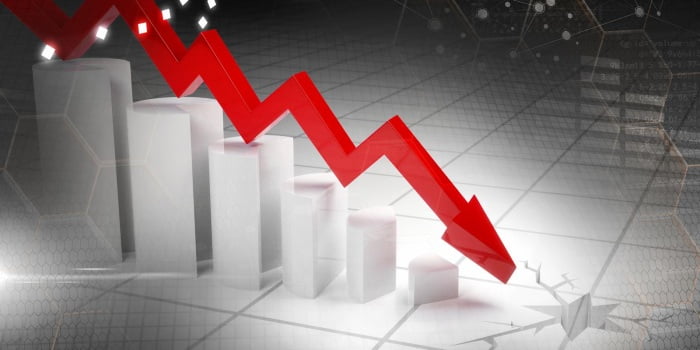The Bank of England (BoE) has raised interest rates again, from 1.25% to 1.75%. And it’s also warning that the UK is heading for a recession. And the impact of a recession on small businesses could be devastating.
To combat rising inflation, the BoE has raised interest rates for the sixth time in a row, by 0.5%, which is the largest increase for 27 years.The rise has been deemed necessary by the Bank, as it is warning that inflation could surpass 13% later this year, an increase on their previous forecast of 9%.
The rate now stands at 1.75%, which is as high as it was during December 2008, during the global financial crisis.
And it could get worse, with the BoE warning that a recession could hit the UK later in the year. The impact of a recession on small businesses could be devastating.
How A Recession Is Defined
A recession is a sign that the economy is doing badly. Normally, the economy of a country grows every month. As a result, the value of goods and services increases, which means the citizens get a bit richer.
But if the economy shrinks because the value of goods and services falls rather than increases two quarters in a row, it is classed as a recession.
The last time this happened in the UK was at the height of the pandemic in 2020 and the impact of this recession on small businesses has been seen and felt across the country.
According to predictions of the BoE, the UK economy will decline by 1% in the last quarter of 2022. Then it expects the economy to shrink every quarter in 2023.
While the last recession, in 2020, lasted for six months, this one is predicted to be a long one. Comparable with the global recession in 2008. And the impact of a recession on small businesses will be even worse, the longer it goes on.
The reason why the Bank of England predicts such a long recession is inflation. Because it has caused such a sharp rise in prices, especially energy prices, people’s incomes are actually falling.
And as the financial body believes that inflation will continue to rise, to above 13% this year, it expects the economy to continue to shrink in 2023.
To further complicate the matter, the mixture of rising inflation and shrinking economy is creating a situation called stagflation. This is very hard to solve, because to prevent a recession the Bank would lower interest rates.
However, to combat inflation, it has just raised them. Equally, the two Conservative leadership hopefuls are also at odds over what should be done. Should taxes be lowered to boost the economy or raised to fight inflation.
Challenges Small Businesses Will Face
Small businesses have already had a tough two years, with the effects of the COVID-19 pandemic still having an impact.
Now they are facing high running costs, especially for energy, as well as high prices for commodities. And because the cost-of-living crisis reduces household budgets, people are saving money by restricting their spending to essentials.
Many small businesses were forced to raise their prices to keep up with rising costs. But with customers having less money in their pockets, this can cause profits to decline.
During the pandemic, many small businesses had to take on loans or accrue debts to survive.
With the continued rise in interest rates, these loans become more expensive to pay back, which might lead to businesses being unable to repay them.
What were once lifeline loans are now going to be hit with more interest, making them more expensive to pay off. Combined with inflation which is pushing up prices of fuel and other goods, the cost of business may become too much for some small businesses.
Lee Murphy, Managing Director at The Accountancy Partnership
If the UK does enter a recession, unemployment rates will rise, which will put further pressure on the financial situation of many people. And it will exacerbate the impact of a recession on small businesses.
How The Impact Of A Recession On Small Businesses Can Be Cushioned
While businesses can take steps to reduce their costs, support also has to come from the Government to reduce the impact of a recession on small businesses.
SMEs are the fabric of British business, and while there are steps businesses themselves can take to weather these high-interest times, the most impactful support must come from the government. Failure to support small businesses will lead to increased insolvencies, spelling trouble for the country’s economy and the wellbeing of entrepreneurs.
Lee Murphy, Managing Director at The Accountancy Partnership
However, at the moment the UK Government is headed up by a Caretaker Prime Minister, who has announced that he will not implement any fiscal policies until his accessor is in post.
So, small businesses will have to wait until a new Prime Minister is in post to get support to cushion the impact a recession might have on them.






